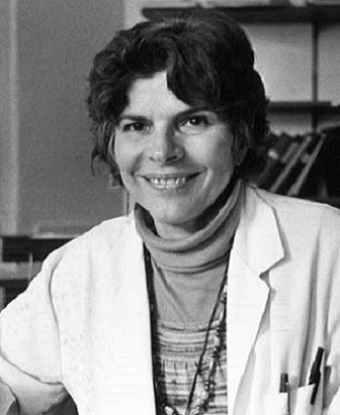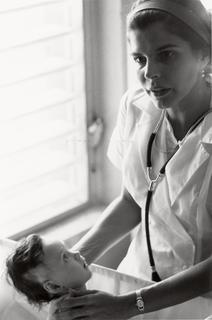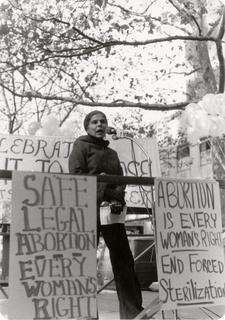Last updated: May 13, 2020
Person
Dr. Helen Rodríguez Trías

Courtesy National Library of Medicine, https://cfmedicine.nlm.nih.gov/physicians/biography_273.html
Dr. Helen Rodríguez Trías was a public health expert and women’s rights activist. She served as the first Latina director of the American Public Health Association. Her understanding of how social and economic inequality shapes people’s health guided her career.
Helen Rodríguez Trías was born in 1929 in New York City to Puerto Rican parents. She grew up in both Puerto Rico and New York. In the United States, Rodríguez Trías faced discrimination at school because she was Latina. School administrators placed her in less advanced classes despite her good grades and English fluency. Only when a teacher noticed her intelligence was she moved to higher-level classes.
Her education set her on a path to medicine. She recalled that being a doctor “combined the things I loved the most, science and people.” Rodríguez Trías studied at the University of Puerto Rico in San Juan. She became involved with the Puerto Rican independence movement.[1]  After graduating in 1960, she completed her residency in pediatrics at University Hospital in San Juan and then began teaching at the medical school there. She also established Puerto Rico’s first infant health clinic. The results of her work were immediate: within three years, infant mortality at the hospital had declined by fifty percent.
After graduating in 1960, she completed her residency in pediatrics at University Hospital in San Juan and then began teaching at the medical school there. She also established Puerto Rico’s first infant health clinic. The results of her work were immediate: within three years, infant mortality at the hospital had declined by fifty percent.
In 1970, Dr. Rodríguez Trías returned to New York and took a job heading the pediatrics department at Lincoln Hospital in the South Bronx. The 1970s were a turbulent time for the hospital. It served mostly Black and Latino patients. Community leaders and activists frequently criticized the hospital for public health violations, crumbling facilities, and negligent care. In 1970, a radical Puerto Rican civil rights organization called the Young Lords staged occupations of hospital buildings. They demanded better care for their community. During her tenure, Dr. Rodríguez Trías worked to train her staff on the needs of Puerto Rican community members. She aimed to find points of agreement among the Young Lords and the other groups who had a stake in the hospital.
Dr. Rodríguez Trías’s work and personal experiences made her pay attention to the ways poverty, inequality, and racism led to poor health. During the 1970s, she brought that understanding to the growing women’s health movement. The women’s health movement had grown from the larger feminist movement of the 1960s. It fought for women’s reproductive rights and to end sexism in healthcare.
Dr. Rodríguez Trías first joined the movement in October of 1970, when she attended a conference about abortion rights at Barnard College.[2] With other women of color, she worked to move the mostly white women’s movement toward a broader conversation around social and economic justice. The “important issues,” she remembered, were “about equity…about getting economic power, about ending violence against women.”
Dr. Rodríguez Trías pursued a broad vision of women’s health justice. She wanted women to be able to choose when and whether to have children, and to get the best possible care either way. She recognized that this looked different depending on a woman’s race and class. Middle-class white women often had to fight to get the birth control they needed. But many poor Latina and Black women had become victims of sterilization abuse. In Puerto Rico, government programs promoted sterilization as a simple and effective method of birth control. These programs were partly driven by concerns about “population control.” While many women chose the procedure, health authorities pressured many others—especially working-class and poor women—to agree to it or falsely told them that it was reversible. Similar programs targeted poorer Black women and girls in the American South. “While young white middle class women were denied their requests for sterilization, low income women of certain ethnicity were misled or coerced into them,” Dr. Rodríguez Trías explained. She argued that the women’s health movement needed to respond to all of this. To work on these problems, Dr. Rodríguez Trías founded the Committee to End Sterilization Abuse and the Committee for Abortion Rights and Against Sterilization Abuse.
Middle-class white women often had to fight to get the birth control they needed. But many poor Latina and Black women had become victims of sterilization abuse. In Puerto Rico, government programs promoted sterilization as a simple and effective method of birth control. These programs were partly driven by concerns about “population control.” While many women chose the procedure, health authorities pressured many others—especially working-class and poor women—to agree to it or falsely told them that it was reversible. Similar programs targeted poorer Black women and girls in the American South. “While young white middle class women were denied their requests for sterilization, low income women of certain ethnicity were misled or coerced into them,” Dr. Rodríguez Trías explained. She argued that the women’s health movement needed to respond to all of this. To work on these problems, Dr. Rodríguez Trías founded the Committee to End Sterilization Abuse and the Committee for Abortion Rights and Against Sterilization Abuse.
In the 1980s, Dr. Rodríguez Trías worked as medical director of New York State’s AIDS Institute, advocating for women and children with HIV. She co-founded the Women’s Caucus and the Hispanic Caucus of the American Public Health Association (APHA). She later became the first Latina director of the APHA.
President Bill Clinton awarded Dr. Rodríguez Trías the Presidential Citizens Medal in 2001. She died later that year in Santa Cruz, California of complications from cancer. In 2019, New York City announced that it will honor her with a statue installed in St. Mary’s Park in the Bronx, near the site of the old Lincoln Hospital.
Notes
[1] The Tower and Quadrangle at the University of Puerto Rico were listed on the National Register of Historic Places on May 17, 1984.
[2] Barnard Hall, formerly Students’ Hall, at Barnard College was listed on the National Register of Historic Places on November 15, 2003.
Bibliography
“Dr. Helen Rodriguez-Trias.” Changing the Face of Medicine. U.S. National Library of Medicine. Last modified June 3, 2015. https://cfmedicine.nlm.nih.gov/physicians/biography_273.html.
Jacobs, Julia. “New York Will Add 4 Statues of Women to Help Fix ‘Glaring’ Gender Gap in Public Art.” The New York Times, March 6, 2019. https://www.nytimes.com/2019/03/06/nyregion/women-statues-nyc.html.
Mckieman-González, John. “American Science, American Medicine, and American Latinos,” in American Latinos and the Making of the United States: A Theme Study. National Park Service, 2013. https://www.nps.gov/articles/latinothemescience.htm.
Pinos, Miriam P. “The Young Lords’ Occupation of Lincoln Hospital.” History of Health in New York, Baruch College, May 17, 2019. https://blogs.baruch.cuny.edu/histmed3450/?p=127.
Reichard, Raquel. “NY to Honor Latina Physician and Women’s Rights Activist Helen Rodríguez Trías With a Monument.” Remezcla.com, Oct. 14, 2019. https://remezcla.com/culture/ny-honor-latina-physician-womens-rights-activist-helen-rodriguez-trias-monument/.
Wilcox, Joyce. "The face of women's health: Dr. Helen Rodriguez-Trias." American Journal of Public Health, 92:6 (June 2002), 895., http://www.ncbi.nlm.nih.gov/pmc/articles/PMC1447119/.
“Guide to the Helen Rodriguez Trias Papers, 1929-2001,” Archives of the Puerto Rican Diaspora, Centro de Estudios Puertorriqueños, Hunter College, CUNY. http://centroweb.hunter.cuny.edu/sites/default/files/faids/rodriguez_triasb.html.
